Falanga may refer to:
The phalanx is a rectangular mass military formation.
ONR may refer to:
PR, P.R., Pr, pr, or Pr. may refer to:

National Democracy was a Polish political movement active from the second half of the 19th century under the foreign partitions of the country until the end of the Second Polish Republic. It ceased to exist after the German–Soviet invasion of Poland of 1939.
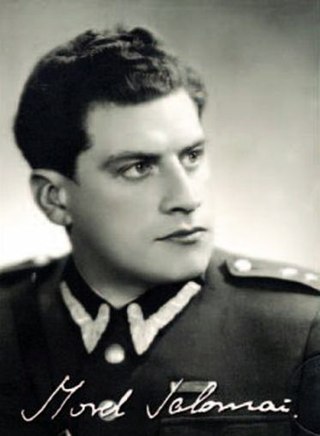
Salomon Morel was an officer in the Ministry of Public Security in the Polish People's Republic, and a commander of concentration camps run by the NKVD and communist authorities until 1956.
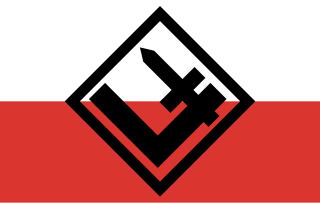
National Rebirth of Poland, abbreviated to NOP, is an ultranationalist far-right political party in Poland registered by the District Court in Warsaw and National Electoral Commission. As of the 2015 election, the party had no seats in the Polish parliament. It was a member of the European National Front.

Foot whipping, falanga/falaka or bastinado is a method of inflicting pain and humiliation by administering a beating on the soles of a person's bare feet. Unlike most types of flogging, it is meant more to be painful than to cause actual injury to the victim. Blows are generally delivered with a light rod, knotted cord, or lash.

The Holy Cross Mountains Brigade was a controversial tactical unit of the Polish National Armed Forces established on 11 August 1944. It did not obey orders to merge with the Home Army in 1944 and was a part of the Military Organization Lizard Union faction, related to the National Radical Camp political party. Its soldiers fought simultaneously with the Nazi Germany, the Soviet Union and the Polish communist underground, though it sometimes collaborated with the Nazis to further its anti-communist, anti-Jewish and totalitarian goals.

In Poland, the resistance movement during World War II was led by the Home Army. The Polish resistance is notable among others for disrupting German supply lines to the Eastern Front, and providing intelligence reports to the British intelligence agencies. It was a part of the Polish Underground State.
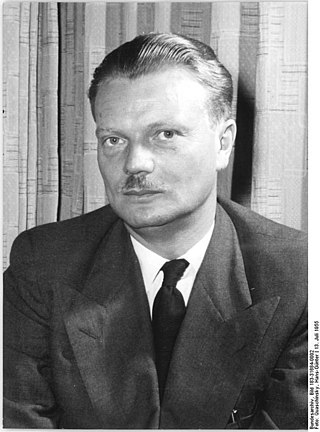
Bolesław Bogdan Piasecki, alias Leon Całka, Wojciech z Królewca, Sablewski was a Polish writer, politician and political theorist. During the war, he was active in the anti-German and anti-Soviet armed underground. Initially of national radical views, he became associated after the war with the ruling Polish communists and led a group of lay Catholics who collaborated with the communist regime.
Camp of Great Poland was a far-right, nationalist political organization of National Democracy in interwar Poland.
The National Radical Camp was an ultranationalist and antisemitic political movement which existed in the pre-World War II Second Polish Republic, and an illegal Polish anti-communist, and nationalist political party formed on 14 April 1934 mostly by the youth radicals who left the National Party of the National Democracy movement.

Confederation of the Nation was one of the Polish resistance organizations in occupied Poland during World War II. KN was created in 1940 by the far-right National Radical Camp Falanga (ONR-Falanga) political party from several smaller underground organizations, including the Secret Polish Army (TAP). In the political realm it was opposed to more centrist mainstream resistance organizations. It would never attract major support and would remain marginal, eventually partially merging with ZWZ around 1941 and finally joining Armia Krajowa around fall 1943.
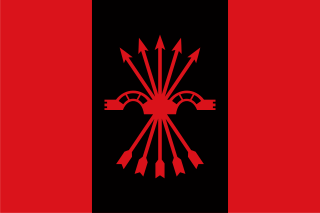
Falange Española de las JONS is a Spanish political party registered in 1976, originating from a faction of the previous Falange Española Tradicionalista y de las Juntas de Ofensiva Nacional Sindicalista. The word Falange is Spanish for phalanx. Members of the party are called Falangists. The main ideological bases of the party are national syndicalism, Third Position and ultranationalism.

Romuald Rajs, nom de guerre "Bury", was a Polish soldier, a member of Home Army (AK) and National Military Union (NZW), an anti-communist insurgent and war criminal. In 1946 the unit under his command burned several Belarusian villages in the region of Białystok and massacred about 79 villagers. He was sentenced to death in a show trial held by the Polish communist government in 1949, charged with membership in delegalized NZW. Following the trial, he was executed in 1949. The verdict was nullified by the Military Court of Warsaw in 1995. In 2005, the Polish Institute of National Remembrance conducted an investigation which revealed that his actions bear the marks of genocide against Orthodox Belarusian community in post-war boundaries of Poland. Rajs is revered by regional nationalist Polish groups as a hero which creates tensions with the local Belarusian and Eastern Orthodox inhabitants.

Andrzej Świetlicki was a Polish politician, a member of the far-right National Radical Movement "Falanga". After the 1939 German invasion of Poland, in October 1939 he formed the collaborationist National Radical Organization. After a few months of collaboration with the Germans, and the takeover of power by the civil administration of the General Government, Hitler issued a ban on cooperation with political organizations in Poland. The NOR was deprived of protection and cooperation from the Nazis. In May 1940, Świetlicki was arrested and imprisoned in Pawiak. On 21 June 1940, he was executed in the Palmiry massacre.
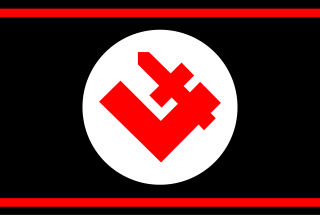
Falanga is a Polish national radical organization which was founded in January 2009. It is led by Bartosz Bekier, former coordinator of the Masovian Brigade of the National Radical Camp (ONR).

The "Falanga" officially the National-Radical Movement, was an illegal political organization formed as a result of a split by Boleslaw Piasecki in the National Radical Camp. Formed as a result of a split in the National Radical Camp. Active mainly at universities, propagating nationalist, anti-Semitic and pro-Catholic slogan. Since 1936 cooperated with the Camp of National Unity. Numbered about 5,000 members. During German occupation, Falanga's activities were continued by Confederation of the Nation.